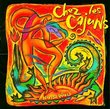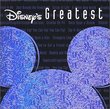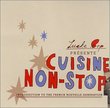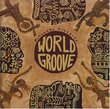| All Artists: Joseph Holbrooke, Haydn Wood, Martyn Brabbins, Glasgow BBC Scottish Symphony Orchestra, Hamish Milne Title: Holbrooke/Wood: Piano Concertos Members Wishing: 0 Total Copies: 0 Label: Hyperion UK Release Date: 2/8/2000 Album Type: Import Genre: Classical Styles: Forms & Genres, Concertos, Symphonies Number of Discs: 1 SwapaCD Credits: 1 UPCs: 034571171272, 034571171272 |
Search - Joseph Holbrooke, Haydn Wood, Martyn Brabbins :: Holbrooke/Wood: Piano Concertos
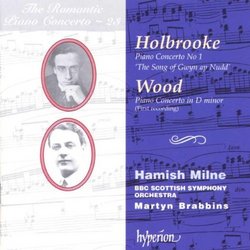 | Joseph Holbrooke, Haydn Wood, Martyn Brabbins Holbrooke/Wood: Piano Concertos Genre: Classical Another hugely enterprising installment of Hyperion's ongoing Romantic Piano Concerto series, coupling two long-buried jewels of British music in irreproachably stylish performances. A prolific composer and brilliant piani... more » |
Larger Image |
CD DetailsSynopsis
Amazon.com Another hugely enterprising installment of Hyperion's ongoing Romantic Piano Concerto series, coupling two long-buried jewels of British music in irreproachably stylish performances. A prolific composer and brilliant pianist, Joseph Holbrooke (1878-1958) was considered one of the most promising young talents on the British musical scene in the years leading up to World War I. His lavish first piano concerto was first heard in 1910, and follows the events of a poem (printed in the booklet) based on a Welsh legend by T.E. Ellis (alias Holbrooke's patron, Lord Howard de Walden). Leave the text to one side, sit back, and revel in one of the most enjoyably extravagant romantic piano concertos you're ever likely to hear. One of the kings of British light music, Haydn Wood (1882-1959) initially studied composition at the Royal College of Music with Stanford, who directed the July 1909 premiere of his pupil's piano concerto in D minor. Grieg, Rachmaninoff, and Tchaikovsky all loom very large indeed in Wood's youthful essay. The Andante slow movement, however, is bewitching. Both works receive performances as immaculately finished as they are utterly dedicated. Tiptop sound, too. No one with a sweet tooth should fail to hear this. --Andrew Achenbach Similarly Requested CDs
|
CD ReviewsCeltic Twilight for Piano and Orchestra Thomas F. Bertonneau | Oswego, NY United States | 10/06/2000 (4 out of 5 stars) "Hyperion's encyclopedic survey of The Romantic Piano Concerto has now reached Volume 23, pairing up two British concerti from the early part of the twentieth century. Joseph Holbrooke (1878-1958) mined Celtic, particularly Welsh, folklore for many of his scores. (His other favorite inspiration was Edgar Allan Poe.) The thirty-six minute Piano Concerto No. 1 "The Song of Gwyn Ap Nudd" Opus 52 (1910) is as much a Lisztian tone-poem with an elaborate program taken from the same bit of Cymric myth that yielded Shakespeare his King Lear as it is a display-work for soloist and orchestra, although it is that too. Critics in Holbrooke's own day as in our own complained that Holbrooke, while long on atmosphere, is short on memorable melody. This detracts from enjoyment much more in the concert hall than it does on disc. Two or three hearings are sufficient to inscribe most of the concerto's thematic material on one's memory, and Holbrooke provides enough musical "action" to make up for the deficiency. The musical language lies somewhere between Liszt and Wagner, influenced in its color by the Russian school. (Make no mistake, Holbrooke is a superb orchestrator.) On the basis of this, I would very much like to hear Holbrooke's other concerti, the ones for violin, for cello, and even for saxophone. Haydn Wood (1882-1959) later made his mark as a supplier of endless "light music." His Concerto in D-Minor for Piano and Orchestra (1909) is a far more orthodox affair than Holbrooke's glittering wayward Opus 52. You might fairly call Haydn's entry a Tschaikovsky Concerto written by an Englishman. It is pleasant and obviously the work of someone in complete control of his art. Hamish Milne, the pianist, is kept busy in both instances. Martyn Brabbins and the BBC Scottish Symphony operate with efficiency and aplomb. Buy this one for the Holbrooke concerto and consider the Wood concerto a worthwhile bonus."
|


